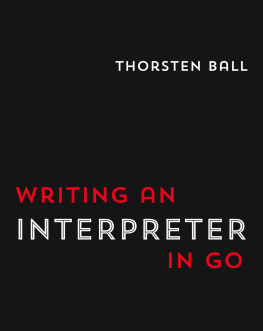
Copyrighted Material
Are You Bilingual?
Copyright 2013 by Octavio Ramirez All Rights Reserved.
No part of this publication may be reproduced, stored in a retrieval system or transmitted, in any form or by any means electronic, mechanical, photocopying, recording or otherwise without prior written permission from the publisher, except for the inclusion of brief quotations in a review.
ISBN: 978-1-61961-906-7
Disclaimer
This books sole intention is to be one of the guides in the readers certification process in becoming a language interpreter. Therefore it is the sole responsibility of the reader to make it happen, through personal effort and dedication to these suggestions that are based on personal experience.
Contents
Preface
D o you enjoy being the bridge between two cultures or between two people that do not speak the same language? Welcome to this wonderful voyage called interpreting.
Now that the immigration code is being enforced, there is a shortage in court interpreters.
Our goal: for you to get an abundance of information about this fascinating profession. I am giving you many resources so you can start making decisions about whether or not this is for you. Ill be telling stories of what we have done, how we help people and the laughs and sorrows of people we encounter on an every day basis. Bottom line: we need you and we are inviting you to join us, sooner than later.
I just want to be clear: it has been a trend to show this as a very difficult profession and that has kept it away from many. But, I dont think thats true and that if we train and prepare, as in all other professions, we will be ready for any challenge we face. I think that to be a good interpreter we have to prepare to be better human beings, language professionals and process guides, since we know both sides of the coin.
Lets jump in by saying that there are different types of these services. The most common ones are Translation (written) Interpretation (spoken), and Sign Language interpreting (used for the deaf).
Now, each one of those forms of interpretation has their uses and places where they are applied. For example, in the legal world you can be interpreting simultaneously while business is going as usual in a court of law and the non-English speaker needs to understand what is going on, then the interpreter will be whispering in the native language the rendition of what is being said. However, when a witness who does not speak English takes the stand, interpreters will switch the rendition to sentence by sentence or in a consecutive mode.
It is important to remember that the interpreter must remain neutral to both sides.
Now a different viewpoint: which side of the interpreting spectrum calls your attention? Legal, Medical, Business, Computers, Translation, by phone Will you be interested in working for the government, for the UN, for the private sector or are you considering starting your own business?
Of course there is money in this profession but it all depends on you. Where do you want to be and how much do you want to prepare for it? Just remember that if you want to succeed as a rocket scientist, or anything in life, you just have to work and study hard. This guide allows you to study in a smart way.
Since you are trying to decide which aspect of interpreting goes with your personality and ambitions, we found this website that will give you more insight and will steer your thinking in the right direction, according to your own personality and skills. Where do I fit? Where will I be able to use all my potential?
http://en.wikipedia.org/wiki/Interpreting
Do you have an idea of what field youll use your bilingual skills in?
Chapter 1
What are interpreters made of?
W e bring to the table an intelligent mind that uses both left and right hemispheres of the head. We are artists that learn many skills backed by lots of cultural concepts and specific terms. Thats why even though I know my gynecological terms, sometimes in a hospital or in a medical telephonic session I have suggested to bring in a female interpreter. I can sense that the Hispanic lady in front of me has reservations about a man being there while she is explaining her health issues. In court that might not be a choice for her and she will have to discuss the personal issues at hand and even a male interpreter will repeat what she is saying.
We, interpreters, also bring in a big heart to understand that people make mistakes and thats the reason why they are in a court of law; that people suffer illnesses and thats why they are in hospitals or at a doctors office; that people are handicapped and need someone to be their voice. By the way, this was a big shock when I started in court and I sensed the callous mentality of some court officers that have worked there for years and years. Unfortunately they are handling the same situations day after day and sometimes the same people coming back over and over and over.
We come in as leaders and directors of traffic, between two cultures, two people and two sets of emotions. You become proactive by knowing and explaining the rules so your session will run smoothly. I suggest that beginning with the end in mind will apply for us when we make sure and know what exactly were there for. You can always ask for certain documents in court that will give you a summary of the case and you can take notes of things that will come up during your interpreting session. Hospitals will be more careful with their documents but you can ask doctors or nurses to give you an idea about the situation.
First things first: each one of us speaks something trying to convey a message. Our commitment, as interpreters, is to express it in the other language as exactly as possible. We have to make decisions between concepts and words that will convey what was said.
Winners will go in with a positive mentality no matter what. Just remember that there are certain word choices that will make situations more explosive or complicated than others. I guess it is better to be thanked for what you do than to feel they are angry with you, because you became part of the problem instead of staying out of it.
Understand vs. understood: in interpreting, they are not opposites. We train ourselves to use our two ears, two languages, two channels, and our two cultures, to express the correct message. We have specific phrases to intervene and ask for clarification in a professional way.
Obviously if you are good at what you do, synergize (1+1= 3, 4 or 5) and everybody will win after this interpreting session. Remember that you will be given thumbs up and you will be hired again, and again.
Sharpening the saw: As we travel a lot, we have many input opportunities to learn new things every day. We carry stocks of audio books in the car; listen to clear spoken stations to better our accent and also listen to variety of their programs to enrich our vocabulary. We cant let this go without passing on one of our best instructors advice, I practice two hours a day.
Now you understand that there are some basic human characteristics oriented to help others in an interpreter and there are many other skills that can be learned and trained for, as in any other profession. This is a people related profession that can be challenging and thats why we suggest you take it serious but with a great sense of humor. Be your best and you have contributed your part.
Chapter 2
Why do I need a sense of humor?
I ts no surprise that to deal with stress you will need a good sense of humor. Many in this profession say that after a day in court you dont need TV because you see the human spirit in all its forms, right in front of you. Just dont allow yourself to become numb and sarcastic about the human suffering; instead just have a laugh or two for the day.






